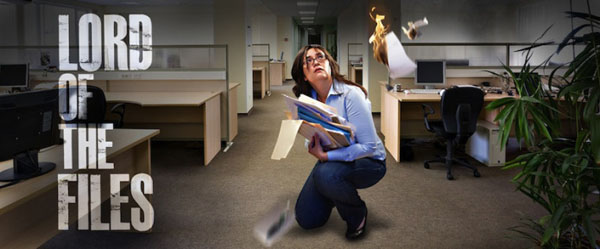
Vancouver Fringe Festival 2014 Review: Lord of the Files
Reviews, TheatreLesley Tsina’s hilarious play, Lord of the Files, is one of those must-see plays for anybody who has ever worked for a corporation, as you may relate to many of the nuances that she weaves into the performance. The sad reality of her play, however, is that it is all completely true and based on a chapter of Tsina’s life in 2006.
Tsina worked for the generically named, Datacorp, one of the boom and bust companies of the mid-2000’s that busted just as Tsina’s career at said corporation seemed to be wearing in like a comfortable Afghan sweater. Nothing helps to ease pain, like prolonging it, and the company decided to keep a part of the staff on for another nine months to see the company to the grave. The irony of the symbolic nine months, which should be bringing about a beginning, rather than an ending, was not lost.
From start to finish, the monologue is filled with such ironies. Tsina keeps referring back to the minutiae technology that Datacorp produced, namely ringtones, backgrounds, and applications (because this was before ‘apps’ became mainstream), yet the workers themselves are corporate detritus.
The subtle references to William Golding’s Lord of the Flies, woven throughout the play, only caught my attention towards to the end, in the final weeks of Datacorp’s existence. The staff segregate into two parties: the fun people and the serious people. Tsina is the latter, and finds herself at her desk, writing out volumes of policies and processes to no foreseeable purpose at first, but then finds out that her work friend has been hired on by the company that bought out the dregs of Datacorp, and will be using at least some of the reams of paper typed by Tsina.
The fun people, however, at the end, descend into savagery, throwing wild parties, getting drunk, and completely forsaking any semblance of work at the office. That descent into savagery was the image that reminded me that the title of the play was a nod to the Golding novel. Then all the imagery came together for me: the metaphor of the crashing plane used to describe the state of Datacorp (‘it was like being on a crashing plane when you can see the seats in front of you go into the water’), the initial bonding over circumstance (the usual workplace cliques melded into one and everyone partied together), the wild abandon with which the director of HR tried to boost morale to keep people from quitting before the end of their nine month tenure through decorating contests (the frenzy of the hunt).
Tsina does an amazing job of detailing life in a dying office, and it is funny, but the humour is lined in black. Ever present, there is the bleak reminder at the back of one’s mind that all these events actually happened not only to Tsina, but probably what was a large group of people who lost their jobs in the mid-2000’s legacy of the bursting of the dot com bubble in 2000 or so.
Go see this play; most of us have worked in an office environment at some point in our lives, and you will be able to relate to the archetypes that seem to pervade in every single office. Thank you, Lesley Tsina, for reminding us to laugh about them.






















